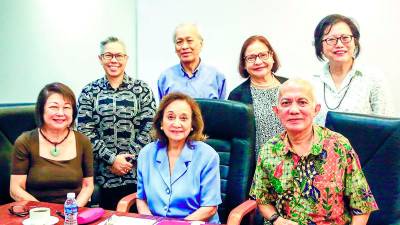PETALING JAYA: The level of English proficiency among Malaysians has experienced a decline, said English Speaking Union of Malaysia (Esum) chairperson Tunku Dara Tunku Tan Sri Naquiah Tuanku Ja’afar.
“It started in the 1990s when Bahasa Malaysia became the main medium of instruction. While we must be proud of our national language, English remains a critical tool for communication, trade, defence and science,” she said, adding that decades of policy shifts have left students unprepared for the global stage.
Speaking ahead of the English Speaking Union International Council Meeting (ICM), she emphasised that English proficiency is not just an academic skill but a gateway to global opportunities. Also present was Sun Media Corp director and Esum council member Datuk Seri Azman Ujang.
“Look at Singapore today. Their success is partly because they retained English. It opens doors in science, technology, the economy… everything.”
Tunku Naquiah also commended Prime Minister Datuk Seri Anwar Ibrahim for his fluency in English on the international stage, adding that leaders set an important example for youths.
She also acknowledged the political sensitivity surrounding language policy in Malaysia, especially when it comes to integrating Chinese or Tamil alongside English and Bahasa Malaysia in schools.
“In England, students learn up to three languages – English, Latin and a third language like French or German. Why can’t we do that here? It doesn’t mean abandoning our national identity, it means preparing students for the world.”
The ICM, scheduled for Sept 29 to Oct 2 in Kuala Lumpur, coincides with Esum’s 25th anniversary.
“This is the first time Malaysia is hosting the global conference, bringing together English Speaking Union representatives from around the world to discuss the future of English language education and its role in global connectivity,” Tunku Naquiah said.
The annual conference venue rotates among member countries, with London hosting it every four years. This year, representatives from 10 countries comprising the UK, United States, France, Australia, Pakistan, Sri Lanka, Bulgaria, Mongolia, Hong Kong and Lithuania will attend in person, while others would participate via Zoom.
Delegates will attend a one-and-a-half-day conference, then enjoy a cultural excursion to Malacca and a visit to the Tuanku Ja’afar Gallery in Seremban. Post-conference tours to Langkawi, Penang, Sabah and Sarawak have also been planned to showcase Malaysia’s rich heritage, culture and diversity.
“This is more than just a meeting. It’s an opportunity to present Malaysia on the world stage (to showcase) not just our hospitality, but also our commitment to promoting English as a bridge for international cooperation.
“English helps build confidence and unlock opportunities. Our goal is to help students, especially the youth, become effective communicators who can contribute positively to the global community,” Tunku Naquiah said.
“We don’t teach our children public speaking or critical thinking skills. In schools, students are discouraged from asking questions. That’s a problem.”
Malaysia has participated in the English Speaking Union International Public Speaking Competition since 2000.
Its young speakers have made a mark globally, winning the world title three times and consistently ranking in the top five.
Despite these achievements, Tunku Naquiah stressed the urgent need for systemic reform in language education.
She also urged a balanced approach – nurturing proficiency in English alongside Bahasa Malaysia and other languages to equip students for global opportunities without compromising national identity.
The English Speaking Union is renowned for programmes in public speaking, debating and effective communication, with improving English proficiency among youth being a central theme.
